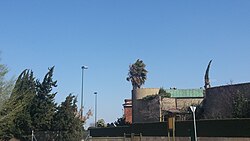Cierzo

The cierzo is a strong, dry and usually cold wind that blows from the North or Northwest through the regions of Aragon, La Rioja and Navarra in the Ebro valley in Spain. It takes place when there is an anticyclone in the Bay of Biscay and a low-pressure area in the Mediterranean Sea. It is more common in autumn and winter, when larger pressure gradients take place, but a small pressure difference along the Ebro valley is sufficient to initiate it in any season.[1]
The cierzo has been known since ancient times, with its name stemming from the Latin word circius, which probably came from an Iberian word. In the 2nd century BC, Cato the Elder described the cierzo as "a wind that fills your mouth and tumbles waggons and armed men."[1]
The cierzo can reach intense speeds. On February 17, 1954, a gust with direction 290 of 135 km/h was recorded at the Zaragoza Airport observatory.[2] Winds faster than 100 km/h are recorded several times each year. The maximum recorded speed is 160 km/h in July 1956.[3]
The cierzo is similar to the mistral of the Rhone valley in France or the bora in the Balcans.[4] It conditions life in the Ebro Valley because it is a drying wind and plants must fight against the dryness that the cierzo produces in the climate. Likewise, farmers must protect their orchard crops with reed barriers or tree plantations, which are called pareteras de caña, enramadas, abrigaños or bardos.[5]
References
- ^ a b R. Riosalido, L. Vazquez, A. Gordo and A. Jansa, «'CIERZO': NORTHWESTERLY WIND ALONG THE EBRO VALLEY AS A MESO-SCALE EFFECT INDUCED ON THE LEE OF THE PYRENEES MOUNTAIN RANGE; A CASE STUDY DURING ALPEX SPECIAL OBSERVING PERIOD.», Scientific results of the Alpine experiment (ALPEX)-VOLUME II, GARP publication series No. 27, WMO/TD No. 108
- ^ Meteorología, Agencia Estatal de. "Zaragoza, Aeropuerto: Zaragoza, Aeropuerto - Valores extremos absolutos - Selector - Agencia Estatal de Meteorología - AEMET. Gobierno de España". www.aemet.es (in Spanish). Retrieved 2022-11-08.
- ^ CUADRAT PRATS, José María, «El clima de Aragón» Archived 2013-09-28 at the Wayback Machine, en J. L. Peña, L. A. Longares y M. Sánchez (eds.), Geografía Física de Aragón. Aspectos generales y temáticos, Zaragoza, Universidad de Zaragoza e Institución «Fernando el Católico», págs. 15-26. 2004.
- ^ PERALES DÍAZ, José Antonio, «Símbolos y representaciones del viento en Navarra», in Cuadernos del Marqués de San Adrián: revista de humanidades, nº. extra 5, 2007, pg. 159-182. «Cierzo, el rey de los vientos», pg. 9-11. ISSN 1579-4806
- ^ ASALE, RAE-; RAE. "bardo | Diccionario de la lengua española". «Diccionario de la lengua española» - Edición del Tricentenario (in Spanish). Retrieved 2022-11-09.
- v
- t
- e
 | This wind–related article is a stub. You can help Wikipedia by expanding it. |
- v
- t
- e











